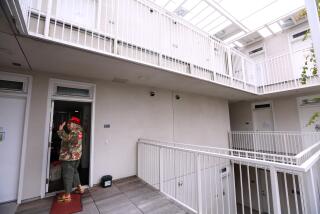Law Firm Tax Urged to Fund Legal Services
- Share via
Saying the poor and middle class are “ignored and excluded” by California’s legal industry, a public interest attorney has proposed that major law firms pay a 6% tax on their earnings to help fund legal services for those who could otherwise not afford it.
At a State Bar hearing Thursday in downtown Los Angeles, Robert Gnaizda of the San Francisco-based public interest law firm Public Advocates Inc., proposed that the Bar spearhead an effort to push through legislation that would tax firms grossing at least $500,000 a year. He also proposed allowing trained “non-lawyer specialists” to provide legal services to the public.
Estimate of $600 Million
The tax, Gnaizda said, could generate approximately $600 million a year in revenue that could be poured into services and training programs that would put quality legal advice within the financial grasp of all Californians.
“There is a growing gap between the needs of the people and the services available,” said Gnaizda, whose nonprofit law firm provides free representation to a clientele composed primarily of the poor and minorities.
“We have in effect benign neglect of the poor and middle class by our legal system. We urge the State Bar to take a leadership position, acknowledge the growing gap . . . and move to adopt these proposals.”
Thursday’s public hearing was an attempt to find ways to narrow that gap, according to members of the Bar. The hearing and another in San Francisco earlier this month was held to examine the issues of non-lawyers providing legal representation and the minimal accessibility many Californians have to the legal system.
“The legal profession is a business now, and it should be taxed,” testified Gnaizda, who later added that the number of California law firms that fall into the tax bracket earn a combined estimate of $10 billion annually.
Gnaizda also called for an amendment to California law that would allow non-lawyers to provide legal services, provided that they undergo rigorous training and are certified by the Bar or a state agency.
‘Underground Legal Economy’
“We want to eliminate the underground legal economy,” said Gnaizda, referring to the network of unqualified people who provide low-cost legal advice. Part of the tax revenue generated by major law firms could be used to subsidize state-accredited institutions where these “specialists” would receive six months of training in a particular specialty, Gnaizda said.
He added that if the Board of Governors does not choose to adopt the positions and present them to the state Legislature, his law firm will take part in an effort to get the tax imposed through the state’s initiative process.
Gnaizda added that the public response would probably be similar to that which brought about Proposition 103, the auto insurance reform initiative. Frank D. Winston, vice president of the State Bar and a member of the Board of Governors, said both suggestions are feasible although the board will probably not make any decisions until April.
More to Read
Sign up for Essential California
The most important California stories and recommendations in your inbox every morning.
You may occasionally receive promotional content from the Los Angeles Times.













